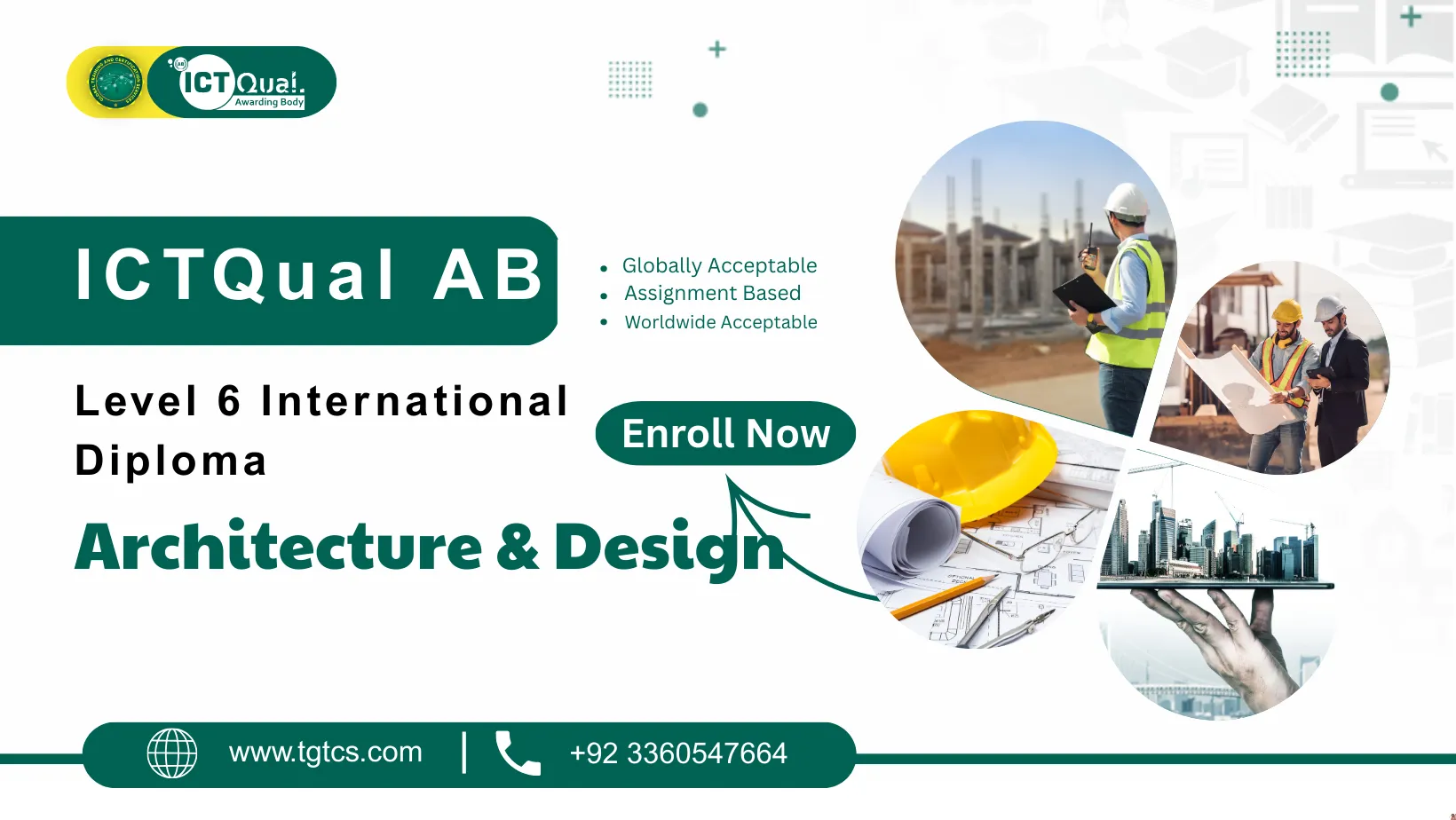ICTQual AB Level 6 International Diploma in Architecture & Design
Architecture and design play a pivotal role in shaping sustainable, functional, and aesthetically appealing environments in today’s rapidly evolving urban landscape. The ICTQual AB Level 6 International Diploma in Architecture & Design is a premier program designed for aspiring architects, designers, and creative professionals seeking to advance their expertise and career prospects in the global architecture industry. This internationally recognized qualification is British Council verifiable, MOFA and Embassy attestable, ensuring credibility and acceptance worldwide.
This comprehensive diploma provides an in-depth understanding of contemporary architectural principles, design methodologies, and advanced project management practices. Learners will explore a wide range of topics, including architectural planning, interior and exterior design, sustainable construction, 3D modeling, and digital design tools, enabling them to transform innovative concepts into practical solutions. The course emphasizes the integration of creativity with technical skills, preparing graduates to excel in both commercial and residential design projects.
By completing this program, learners will gain highly sought-after skills such as professional design communication, structural analysis, architectural visualization, and critical problem-solving. Practical applications and hands-on projects embedded in the curriculum ensure that students develop the ability to manage real-world design challenges efficiently. This diploma also opens doors to lucrative career opportunities in architecture firms, design consultancies, urban planning agencies, and freelance design entrepreneurship.
The ICTQual AB Level 6 International Diploma in Architecture & Design is ideal for professionals aiming to enhance their creative capabilities, achieve international accreditation, and secure high-demand roles in the architecture and design sector. It equips learners with the knowledge, credentials, and confidence needed to thrive in an increasingly competitive and globalized industry.
High-CTR Keywords integrated: International Diploma in Architecture & Design, Level 6 Architecture & Design course, British Council verifiable architecture diploma, MOFA attestable design diploma, professional architecture certification, architecture and design career, sustainable architecture course.
The Global Training and Certification Services is Approved Training Centre of ICTQual AB UK Ltd
This internationally recognized diploma provides a flexible and practical route for advancing your career in architecture and design. The program is designed to accommodate learners at all stages of their professional journey.
Course Level and Credits
Level 6 International Diploma, 360 credits.
Suitable for fresh learners and experienced professionals seeking advanced international recognition in architecture and design.
Mode of Study
Fully assignment-based; learn at your own pace.
Accessible from anywhere in the world, flexible for working professionals and self-learners.
Global Recognition & Attestation
British Council verifiable, MOFA and Embassy attested.
Recognized for career advancement, employment, and iqama approval in Gulf countries.
Scope and Purpose
Comprehensive coverage of architectural principles, design methodologies, sustainable construction, and project management.
Focus on both theoretical understanding and practical application in real-world architecture and design projects.
Skills and Knowledge Gained
Architectural planning, interior and exterior design, 3D modeling, and digital design tools.
Creative problem-solving, professional design communication, structural analysis, and project management skills.
Career Benefits
Opens opportunities in architecture firms, design consultancies, urban planning agencies, and freelance design entrepreneurship.
Enhances professional credibility, employability, and international recognition in the architecture and design industry.
Target Audience
Fresh students aiming to build a career in architecture and design.
Experienced professionals seeking accelerated certification through verifiable experience and professional discussion.
Unique Selling Points (USPs)
Flexible self-paced study, fully assignment-based.
Prestigious and globally recognized Level 6 diploma.
Ideal for job opportunities, career growth, and iqama approval.
Mandatory Unit
This qualification, the ICTQual AB Level 6 International Diploma in Architecture & Design, consists of 36 mandatory units.
Year 1 – Foundation in Architecture & Design
- Principles of Architecture and Design
- Introduction to Architectural Projects
- Construction Materials and Methods
- Design Theory and Spatial Planning
- Project Planning and Scheduling
- Health, Safety, and Environmental Awareness
- Communication and Stakeholder Management in Design
- Construction Technology Fundamentals
- Financial Management in Architectural Projects
- Quality Assurance and Control in Design
- Legal and Regulatory Frameworks in Architecture
- Professional Ethics and Conduct in Design
Year 2 – Intermediate Architecture & Design Practices
- Advanced Architectural Design Techniques
- Resource Management and Allocation in Projects
- Project Cost Estimation and Budgeting in Design
- Construction Contract Administration
- Procurement and Supply Chain Management
- Project Risk Analysis and Mitigation
- Leadership and Team Management in Design Projects
- Site and Workshop Management in Architecture
- Sustainable Design and Environmental Management
- Project Monitoring and Reporting
- Problem-Solving and Decision-Making in Design Projects
- Communication and Negotiation Skills in Architecture
Year 3 – Advanced Architecture & Strategic Leadership
- Strategic Architectural Project Management
- Advanced Construction and Design Project Planning
- Infrastructure and Urban Design Management
- Innovation and Emerging Technologies in Architecture
- Advanced Risk and Crisis Management in Projects
- Contract Management and Legal Compliance
- Leadership in Architectural Projects
- Advanced Project Control and Performance Measurement
- Project Governance and Compliance in Design
- Research Methods and Project Analysis in Architecture
- Capstone Project in Architecture & Design
- Professional Development and Career Planning
Upon successful completion of the ICTQual AB Level 6 International Diploma in Architecture & Design, learners will acquire advanced knowledge, practical skills, and professional competencies essential for excelling in the global architecture and design industry.
Year 1 – Foundation in Architecture & Design
Principles of Architecture and Design
- Understand the core principles and elements of modern architecture and design.
- Analyze architectural styles, trends, and historical influences.
- Apply foundational design techniques in practical projects.
- Develop creative and functional design solutions aligned with industry standards.
Introduction to Architectural Projects
- Learn project conceptualization, planning, and initiation processes.
- Understand project life cycles and workflow in architecture and design.
- Gain skills in basic project documentation and reporting.
- Build confidence in translating design ideas into structured project plans.
Construction Materials and Methods
- Identify construction materials and their applications in modern architecture.
- Understand construction techniques, methods, and best practices.
- Evaluate material properties for durability, sustainability, and cost-effectiveness.
- Apply knowledge of materials in small-scale design projects.
Design Theory and Spatial Planning
- Develop skills in spatial analysis and functional design layout.
- Apply design theories to optimize aesthetics and utility.
- Understand principles of ergonomics and human-centered design.
- Integrate spatial planning into architectural project proposals.
Project Planning and Scheduling
- Learn techniques for project timeline creation and milestone planning.
- Apply scheduling tools for efficient resource and task management.
- Understand dependencies, constraints, and risk factors in project planning.
- Prepare detailed project plans aligned with client requirements.
Health, Safety, and Environmental Awareness
- Recognize health, safety, and environmental standards in architecture.
- Implement safety protocols on construction sites and design projects.
- Evaluate environmental impact and sustainable design considerations.
- Promote responsible and compliant design practices.
Communication and Stakeholder Management in Design
- Develop effective communication strategies with clients and teams.
- Learn negotiation and collaboration skills in architectural projects.
- Manage stakeholder expectations and requirements.
- Enhance professional presentation and reporting skills.
Construction Technology Fundamentals
- Understand modern construction technologies and their applications.
- Evaluate digital tools, software, and techniques for building design.
- Apply technology knowledge to improve project efficiency.
- Analyze construction workflows for practical problem-solving.
Financial Management in Architectural Projects
- Understand budgeting, cost estimation, and financial planning in design projects.
- Apply financial management principles to optimize resource use.
- Monitor project expenses and ensure budget compliance.
- Develop skills in financial reporting for architectural projects.
Quality Assurance and Control in Design
- Implement quality standards in architectural and design projects.
- Conduct inspections and ensure adherence to project specifications.
- Evaluate processes to maintain high-quality outcomes.
- Apply continuous improvement methods in design workflows.
Legal and Regulatory Frameworks in Architecture
- Understand building codes, zoning regulations, and planning permissions.
- Apply legal frameworks in project design and implementation.
- Ensure compliance with local, national, and international standards.
- Mitigate legal risks in architectural practice.
Professional Ethics and Conduct in Design
- Learn ethical principles and professional responsibilities in architecture.
- Promote integrity, accountability, and professionalism in design projects.
- Understand cultural and social responsibilities in architectural practice.
- Develop a professional code of conduct for workplace excellence.
Year 2 – Intermediate Architecture & Design Practices
Advanced Architectural Design Techniques
- Apply advanced design principles to complex projects.
- Integrate aesthetics, functionality, and sustainability in designs.
- Develop innovative and practical architectural solutions.
- Use digital tools to enhance design visualization and accuracy.
Resource Management and Allocation in Projects
- Optimize use of human, material, and financial resources.
- Apply resource planning strategies for design efficiency.
- Monitor allocation to ensure project deadlines and quality standards.
- Develop contingency plans for resource-related risks.
Project Cost Estimation and Budgeting in Design
- Conduct accurate cost estimations for construction projects.
- Apply budgeting techniques to maintain financial control.
- Analyze cost-benefit of materials, methods, and resources.
- Prepare detailed financial reports for stakeholders.
Construction Contract Administration
- Understand contract types, terms, and obligations in architecture.
- Manage project contracts effectively from initiation to completion.
- Resolve contractual disputes and maintain compliance.
- Ensure alignment of contracts with project goals and client requirements.
Procurement and Supply Chain Management
- Develop strategies for procurement of materials and services.
- Manage supply chains to ensure timely and cost-effective delivery.
- Evaluate supplier performance and maintain professional relationships.
- Integrate procurement planning into project management.
Project Risk Analysis and Mitigation
- Identify potential risks in architectural projects.
- Develop strategies to mitigate project delays, cost overruns, and design failures.
- Apply risk assessment tools to real-world scenarios.
- Enhance decision-making through proactive risk management.
Leadership and Team Management in Design Projects
- Develop leadership skills for managing design teams.
- Promote collaboration, motivation, and productivity.
- Resolve conflicts and foster positive team dynamics.
- Implement project management frameworks to guide team efforts.
Site and Workshop Management in Architecture
- Apply best practices for site supervision and workshop operations.
- Ensure compliance with health, safety, and quality standards.
- Monitor construction progress and manage onsite resources.
- Integrate site observations into project reporting and decision-making.
Sustainable Design and Environmental Management
- Apply principles of green architecture and sustainability.
- Integrate energy-efficient and eco-friendly solutions into projects.
- Evaluate environmental impact of construction methods and materials.
- Promote sustainable practices in design and construction projects.
Project Monitoring and Reporting
- Track project progress against schedules and budgets.
- Prepare detailed progress reports for clients and stakeholders.
- Identify performance gaps and recommend corrective actions.
- Use project monitoring tools for efficient oversight.
Problem-Solving and Decision-Making in Design Projects
- Apply critical thinking to architectural challenges.
- Develop creative solutions for design and construction issues.
- Make informed decisions considering technical, financial, and aesthetic factors.
- Enhance project outcomes through effective problem-solving strategies.
Communication and Negotiation Skills in Architecture
- Develop persuasive communication for clients, contractors, and teams.
- Conduct negotiations for project contracts, budgets, and resources.
- Enhance professional collaboration and conflict resolution skills.
- Apply communication strategies to support project success.
Year 3 – Advanced Architecture & Strategic Leadership
Strategic Architectural Project Management
- Apply strategic planning and management principles in large-scale projects.
- Align project objectives with organizational goals.
- Optimize resource allocation for strategic project delivery.
- Evaluate project outcomes to inform future strategies.
Advanced Construction and Design Project Planning
- Develop comprehensive project plans integrating design and construction workflows.
- Use advanced software tools for project scheduling and visualization.
- Identify dependencies and plan for risk mitigation.
- Ensure efficient coordination across all project phases.
Infrastructure and Urban Design Management
- Understand principles of urban planning and infrastructure design.
- Integrate functionality, aesthetics, and sustainability in urban projects.
- Manage large-scale public and private infrastructure projects.
- Assess social, environmental, and regulatory considerations in urban design.
Innovation and Emerging Technologies in Architecture
- Apply cutting-edge technologies in design and construction.
- Explore BIM, 3D printing, VR, and AI in architectural projects.
- Enhance project efficiency and accuracy through innovation.
- Stay updated with emerging trends and technological advancements.
Advanced Risk and Crisis Management in Projects
- Identify complex risks in architectural and urban projects.
- Develop proactive and reactive risk management strategies.
- Implement crisis response plans to mitigate project disruptions.
- Ensure project continuity under challenging conditions.
Contract Management and Legal Compliance
- Apply advanced knowledge of construction law and contractual obligations.
- Ensure compliance with local, national, and international regulations.
- Resolve disputes through negotiation and legal frameworks.
- Protect organizational and client interests in complex projects.
Leadership in Architectural Projects
- Develop executive-level leadership and decision-making skills.
- Lead multi-disciplinary teams across projects.
- Foster innovation, collaboration, and high performance.
- Manage strategic and operational challenges effectively.
Advanced Project Control and Performance Measurement
- Monitor and evaluate project performance using KPIs and metrics.
- Implement corrective actions for schedule, cost, and quality deviations.
- Apply advanced project control techniques for complex projects.
- Ensure continuous improvement in project outcomes.
Project Governance and Compliance in Design
- Establish governance structures for architectural projects.
- Ensure adherence to policies, regulations, and ethical standards.
- Evaluate project compliance and stakeholder satisfaction.
- Promote accountability and transparency in project management.
Research Methods and Project Analysis in Architecture
- Apply qualitative and quantitative research techniques in design projects.
- Analyze project data for informed decision-making.
- Conduct feasibility studies and technical assessments.
- Prepare research-based reports and recommendations for complex projects.
Capstone Project in Architecture & Design
- Integrate knowledge and skills from all previous units into a major project.
- Demonstrate creativity, technical expertise, and project management abilities.
- Present a professional-level architectural solution to real-world challenges.
- Apply strategic thinking and practical skills to complete a comprehensive project.
Professional Development and Career Planning
- Develop a career roadmap for growth in architecture and design.
- Enhance professional skills, networking, and portfolio development.
- Identify opportunities in domestic and international architecture sectors.
- Build competencies for long-term success and global recognition.
This internationally recognized diploma equips learners with advanced skills, practical knowledge, and professional credentials to excel in the global architecture and design industry.
Advanced Architectural Knowledge
- Gain comprehensive expertise in architectural design, spatial planning, and construction management.
- Learn modern design techniques and apply them to real-world architectural projects.
Sustainable and Innovative Design Skills
- Understand and implement sustainable construction and eco-friendly design practices.
- Explore innovative tools, technologies, and digital solutions in architecture and design.
Global Recognition and Certification
- Obtain a British Council verifiable, MOFA and Embassy attestable certification.
- Achieve international credibility to enhance career opportunities and iqama approval.
Career and Professional Advancement
- Improve employability in architecture firms, design consultancies, and urban planning organizations.
- Develop leadership, strategic planning, and project management skills for high-level roles.
Practical Application and Problem-Solving
- Apply theoretical knowledge to practical assignments and real-world design challenges.
- Build critical problem-solving and decision-making skills to manage complex projects.
This diploma ensures learners acquire the knowledge, experience, and credentials required to thrive in competitive architecture and design careers worldwide.
This course is designed for learners from diverse professional and educational backgrounds who aim to advance their careers in architecture and design while gaining internationally recognized credentials.
Aspiring Architects
- Build a strong foundation in architecture principles, design techniques, and project management.
- Gain practical skills to plan, design, and execute architectural projects with professional confidence.
Design Professionals Seeking Career Growth
- Upgrade technical and creative expertise to take on advanced roles in architecture and design projects.
- Obtain globally recognized Level 6 certification for career advancement and iqama approval.
Experienced Professionals with Relevant Experience
- Fast-track the qualification by validating at least six years of professional experience.
- Demonstrate knowledge and competence through professional discussion meetings with an ICTQual AB approved assessor.
Students and Graduates of Architecture or Design
- Strengthen practical knowledge and real-world application skills through assignments.
- Build a professional portfolio to secure employment or freelance opportunities internationally.
Entrepreneurs and Freelance Designers
- Develop leadership, project management, and client communication skills for business growth.
- Gain international recognition and credibility to attract global projects and clients.
This course is ideal for learners at all stages who want to combine creativity, technical expertise, and internationally accredited credentials to excel in architecture and design careers worldwide.
Course Overview
Course Level
Level 6
Course Units
36 Units
Credits
360
Duration
3 years






